BEST IN CLASS: CM Mag's Top 10 Freeware Synths
_____________________________________________________
.
Best Of List
Mac/Windows/Linux
Format: Various
Price: FREE!
______________________________________________________
A while back Computer Music Magazine released a Special Issue called "The Fast Guide To Synthesis" in which they rated what they deemed the Top 10 Commerical and Top 10 Freeware Synths. I enjoyed the article, as there are very few things like this that ever make it to print, but I couldn't help but find it kinda funny that out of the 10 free synths listed, one was a time-limited demo version (KarmaFX), one had an obtrusive nag screen pop-up every minute (Foorius) and 3 were only available if you purchase their magazine (Dominator, ZebraCM, and Wusikstation CM). Still, I think the ones that came with the magazine are well worth the purchase price. I guess there's a blurry line with the definition of free; even though the synths are released under a free license, you have to pay for the magazine to get them. This is not a complaint as much as a curiosity - the CM synths are wonderful!
So here is what they came up with for The Top 10 Freeware Synths:
All commentary about the software below is mine, not copied from the article.

SmartElectronix/dmi Foorius
Semi-Modular Analog, AM, FM, and Wavesequencing Synthesizer
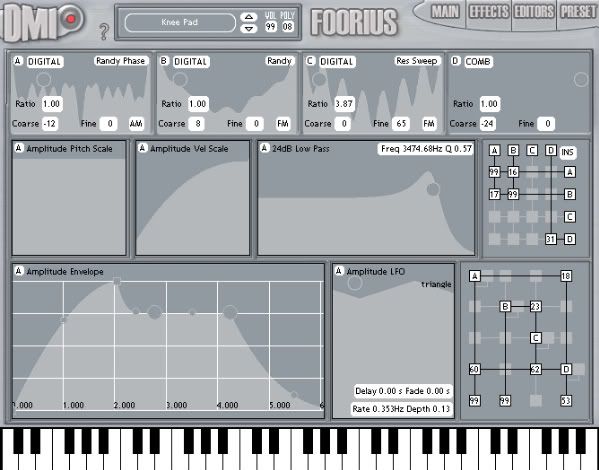
Type: Semi-Modular Analog, AM, FM, and Wavesequencing
Platform: PC
Format: VST, Linux
License: Freeware w/dontation screen at startup
Audio example: MP3 demo (100% Foorius)
Feature-wise, dmi's Foorius is a excercise in excess; the kitchen sink of soft synths as it were. But Foorius has proven to not simply be excessive for the sake of excess. You would be hard-pressed to find a sound that you couldn't make with this powerhouse of an instrument. The price belies its power, as it sells for whatever you decide it's worth (donationware). You can also use it for free if you don't mind the simple nag screen when it starts. So all that power does come at a price - it's just a very small one!

SK Vivaldi MX
FM Synthesizer
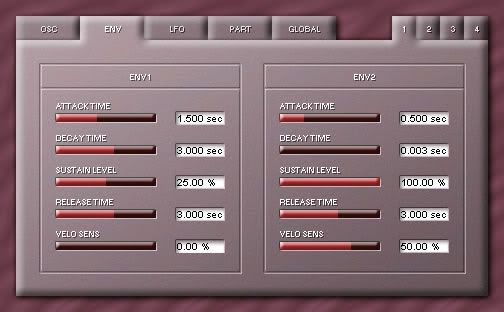
Type: FM
Platform: PC
Format: VST, Linux
License: Freeware
There are far less good FM (Frequency Modulation) synths in the world of freeware compared to the subtractive sort, but Vivaldi MX is one of the few. This is basically a version 2 of Vivaldi, Stefan Kuhn's first attempt at a VSTi (Virtual Studio Technology Instrument), and it comes with a welcome increase of features and updates. Some would argue that Stefan Kuhn's Ganymed is even better than Vivaldi MX as a go-to FM synth, some would say they are just different tools. What's the best way to find out? Try 'em both for yourselves - they're both free!

Smart Electronix Augur
Vector Synthesis (Prophet VS clone)
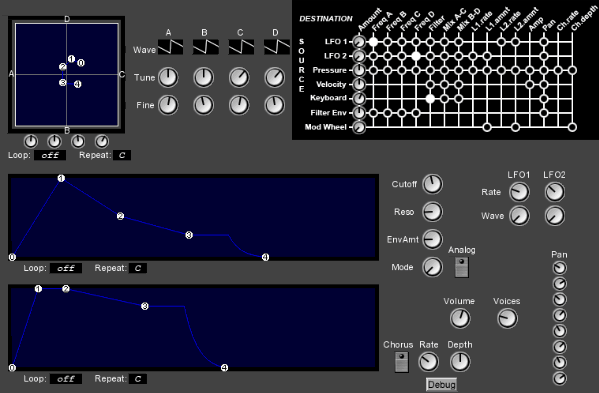
Type: Vector Synthesis (Prophet VS clone)
Platform: PC, Linux, Mac OSX
Format: VST
License: Freeware
Audio example: MP3 demo
The CM Magazine article says that Augur seems to be perpetually stuck in beta. Well, as we have learned from Google, that doesn't always equate to a poor product. The difference is that in this case the developer (Antti, one of the SmartElectronix team) seems to have moved on to other projects. The good news is that the current version is very stable and sounds very, very good! So if there is still work to be done, it may be under the hood somewhere in an insignificant bug or two. Search for additional presets floating around the web - they will vastly increase your patches since the stock version doesn't come with many.
Arturia recently released a Prophet 5 clone, but the big surprise came when customers found out that they also happened to include a near-perfect clone of the Prophet VS as well! Once that news was out people were rushing to get their hands on this new Arturia soft synth. The cool thing is that those of us who can't afford to rush out and buy every VSTi we get excited about have the opportunity to use the Prophet 5 and the Prophet VS for free. Roberson Audio Synthesizers released a very well done Prophet 5 clone here, and Augur is the Prophet VS. So if you don't mind having them as two separate plug-ins, it's all your gain!

Paul Nasca ZynAddSubFX
Analog Subtractive, Additive Synthesizer
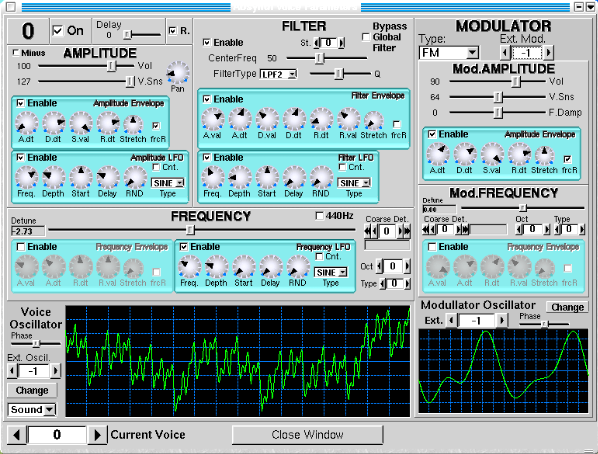
Type: Analog Subtractive, Additive
Platform: PC, Linux, Mac OSX
Format: VST, AU, STANDALONE
License: Freeware (Open Source)
Audio example: MP3 demo (100% ZynAddSubFX)
ZynAddSubFX has always been an odd synth to me. For one, it looks like no other, showing its Linux roots in its design. It also has 3 synths built into one. They are not simply being able to choose between different kinds of oscillators; there are actually 3 different synth engines in this puppy! ADsynth is the additive synthesizer, SUBsynth is the subtractive, and PADsynth excels at atmospheric dreamy sounds.
Another feature that is unique to not only this Top 10 list, but also to most other synths is that ZynAddSubFX is released under the GPL 2 license. This allows anyone to freely download the source code and make any changes or additions that they choose, assuming they have the skill to do so. It is also the only synth natively available for the "big 3" operating systems: Mac, PC, and Linux. Impressive!
I emailed one of the main developers on the ZynAddSubFX team who is in charge of rehauling the interface, and he assured me that positive changes are coming with the design as well as new features.
Give ZynAddSubFX a try. If you persist through its uniqueness, you will find a rare diamond in the rough!
Except for it's not a diamond.
And it's not really that rough, just a little ugly!

Green Oak Crystal
Semi-Modular Subtractive & FM Synthesizer

Type: Semi-Modular Subtractive & FM
Platform: PC, Linux, Mac OSX (Intel & PPC)
Format: VST, AU
License: Freeware
Audio example: MP3 demo (100% Crystal)
Crystal has been around a long time, earning itself a large following from the very beginning. Rumor has it that Glenn Orlander, its creator, was scooped up by a commercial music software company after seeing what he single-handedly created with Crystal. Now that's about the biggest compliment you could probably get from someone, not to mention the monetary contribution, eh?
What to say? Crystal does it all - analog modeling, SF2 import for osillator use, FM, semi-modular routing, and basic wavesequencing. But all that would mean nothing if it weren't for the sound. Crystal sounds fantastic! Even when relegated to doing simple 2 oscillator subtractive synthesis, Crystal is great. But you really have no excuse to leave Crystal to do that kind of work when it is capable of so much more. There are actually multiple 9-stage envelopes on board here! This kind of contol is what allows motion reminiscent of movie scores, which is why Crystal is often recommended as a free alternative to Native Instruments Absynth, the nearly ubiquitous king of the Hollywood sound stage. Crystal and Absynth are definitely different beasts, but someone with a little determination could pull the same sounds out of either synth. Maybe somebody needs to tell Hollywood!
Be sure to get the additional waves (for oscillators) and presets! They will greatly expand the usefulness of Crystal. For help with using this amazing synth, try the User Guide or visiting the Yahoo Group dedicated to Crystal.

CM Dominator
Analog Subtractive Synthesizer
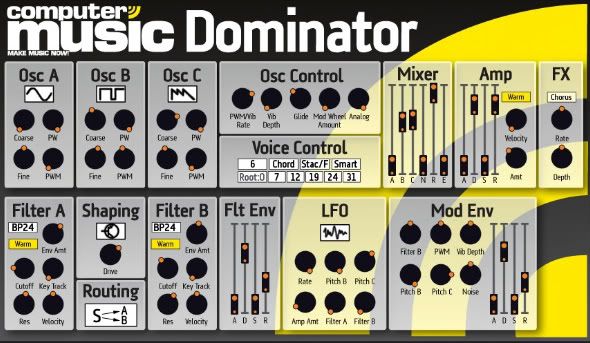
Type: Analog Subtractive
Platform: PC, Linux
Format: VST
License: Freeware (only available with magazine)
Audio example: MP3 demo (100% Dominator)
Here are a few lines about Dominator from the article:
> "One of the best sounding analog synthesizers available anywhere, for any price."
> "From its over-the-top color scheme, to its blistering oscillators, everything about Dominator ensures that this triple-oscillator tyrant will reign over any mix."
> "Dominator rules with brutal waveshaping,,,"
> "Unlike some rulers, though, Dominator will allow you unheard of freedoms..."
Man, whoever wrote that must have majored in English with a minor in Hyperbole. But I must admit, the deeper I got into Dominator, the more surprised I was. Maybe I just didn't like the design or something, but my first instinct was to not like it. However, I gradually began to fall for its combination of great sounds and simplicity to program. It's also very full-featured synth for something so simple to use. It's a great synth for those of you who are just beginning to learn subtractive synthesis as there are many really good patches to start with that are easily caressed into anything you might need them to be.

u-he Zebra CM
Analog Subtractive Synthesizer
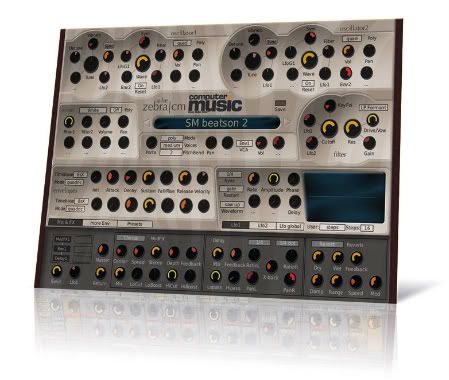
Type: Analog Subtractive
Platform: PC, Linux, Mac OSX
Format: VST, AU
License: Freeware (only available with magazine)
Audio example: MP3 demo
On the exact opposite side of the spectrum as the #5 CM Dominator sits the #4 u-he Zebra CM - quiet, unassuming, and unhyped. In fact, even unhyped is a little overdoing it. Nobody would even say what features this free synth was going to have until you actually bought the magazine and tried it yourself! People at KVR were asking the developer what the features would be, but he wouldn't tell. And the usually happy-to-toot-their-own-horn CM Mag had precious little to add.
It ends up that the CM edition of Zebra is about as kick-butt as a free VST can get, both in terms of its sound quality and its uniqueness. It is also a highly flexible synth, being able to pound out aggresive leads as easily as beautiful, lush soundscapes, and all with a unique character. I guess you could say that Zebra has its own sound, although not everyone may notice. If you've heard and played with enough of them over the years you probably start to develop a sense that can tell them apart, or tell you if they are nothing special as well!
In my humble opinion Zebra CM is the best sounding synth on this list, and is worth more than the $15 for the magazine in itself. In fact, all of the CM synths on this list are available in every issue, as the "CM Studio" is a progressive collection that builds on itself with each new release. Get it now!

Andreas Ersson polyIblit
Analog Subtractive Synthesizer
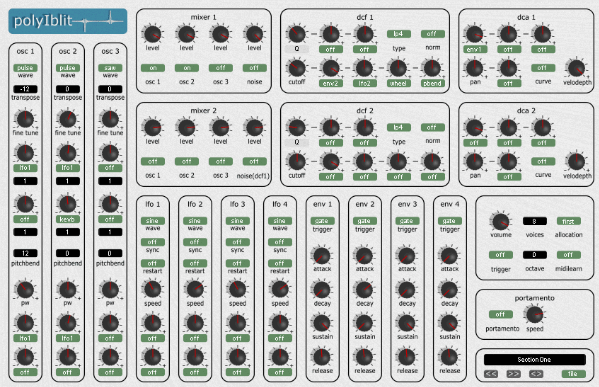
Type: Vector/Granular/Wavesequencing Synthesizer/Sampler
Platform: PC, Linux, Mac OSX
Format: VST, AU, STANDALONE
License: Freeware
Audio example: MP3 demo (current version)
An oldie but a goodie, polyIblit is either one of the most underrated or overrated synths ever. It depends on who you talk to, and I am reserving my opinion on this one. There is a lot to like about it, no matter what side of the line you stand. The first is the sound of the oscillators. Developer Andreas Ersson employs a process he dubs "Band Limited Impulse Train", which is where the "blit" comes from. I don't fully understand the technology, but it has something to do with limiting part of the frequencies of the oscillator, which prevents aliasing. I'm sure it's not simply a low-pass filter, or at least I hope it's not! "Band Limited Impulse Train" would be about the fanciest way to say something like that if it were. :-)
polyIblit's 3 oscillators pump out saw, triangle, square, pulse, or noise, and are fed through one of three filter modes (with resonance). The signal path then goes to 4 tempo-synced LFO's, and/or 4 ADSR envelopes. The modulation implementaion (say that 10 times fast...) is amazing, and rivals the flexibility of a real modular.
Another excellent thing missing from so many free synth but here in spades is one of the most logical interfaces ever! It almost rivals the Minimoog for common sense layouts. If you are new to synthesis and have a difficult time understanding functions and/or signal flow, I would highly recommend polyIblit as a synth to cut your teeth on. Everything is clearly (if not blandly) and logically laid out for quick, easy access to any point of the signal path. You also don't need to access that which you don't understand. This would be a straight-forward synth if you just used the oscillators and filters - you couldn't get lost!
And on a final note, if you just need a monosynth, grab iBlit while you're over there. It is the monophonic version. (Get it? iBlit? polyIblit?) I use them both, actually, as iBlit has a lower CPU overhead....

Wusik Wusikstation CM
Vector/Granular/Wavesequencing Synthesizer/Sampler
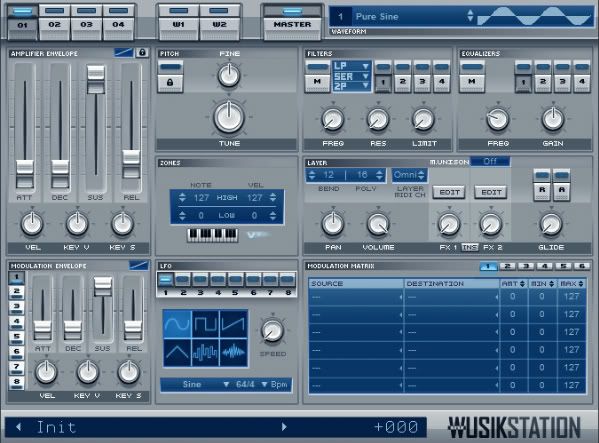
Type: Vector/Granular/Wavesequencing Synthesizer/Sampler
Platform: PC, Linux, Mac OSX
Format: VST, AU, STANDALONE
License: Freeware
Audio example: MP3 demo (current version)
Wusikstation CM is basically version 1 of the mighty Wusikstation by producer and software developer William K. There is quite a difference between the current version 5 and the CM version. However, if you just change your mentality a bit, you could get along just fine with the free CM version. It is a very unique VST instrument, and as long as you aren't always trying to compare it in your head to what the current version offers this very second, you will have an impressive wavetable synth ready to go in your plug-in folder!
The full version of Wusikstation may have the biggest ratio of features to price of any commercial VST. You can buy the full version for $39.95, and I believe there is even a discount for registered CM users (I bought the upgrade but can't remember what I paid!) For a feature list try this link.
If you are thinking of upgrading or just want to learn more, check out the free instruction videos and the user manual, both free at wusik.com.

Ogo KarmaFX Synth
Semi-Modular Synthesizer
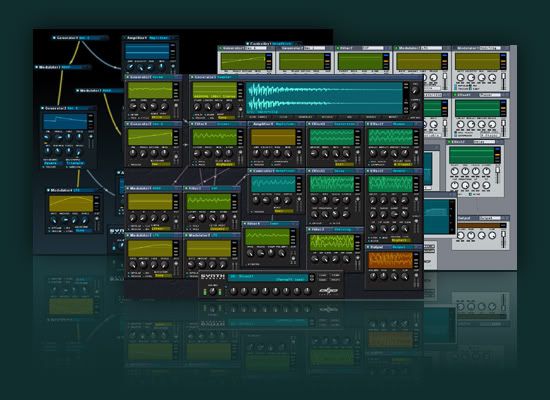
Type: Semi-Modular Synthesizer
Platform: PC, Linux
Format: VST
License: Commercial, with 30 day demo available
Audio example: MP3 demo
KarmaFX is a monster of a modular synth. I don't know of anything else quite like it. It is similar to Native Instruments Reaktor, but it is much easier to use. It is similar to SynthEdit, but it does not export your creations as static, never changing VST's. It is similar to Buzz, but KarmaFX runs as a VST plug-in directly within a DAW (Digital Audio Workstation), and Buzz does not.
It definitely fills a gap in that you can be cruising right along in a recording or songwriting session and suddenly realize that you need a certain sound; one that none of your current plug-ins can create. If you had KarmaFX, you would be saved! Just pull up an instance of it and start connecting the pre-configured modules together. You can custom make just about any instrument or effect you can dream of, in a much friendlier environment that Reaktor.
There is a PDF manual that comes with it, as well as tutorials and a helpful forum for direct questions. If you are curious about the inner workings of instruments or effects, but you cringe at the thought of reading through 900-page manuals or taking weeks to make a simple bass synth, go ahead and download the 30-day demo of KarmaFX. The demo doesn't save and it times out periodically, but it should give you enough of a chance to tell if it does what you want it to and at a level you can understand!
So there you have it - my take on The Top 10 Freeware Synths, as published by Computer Music Magazine. I hope you've enjoyed the read!


0 comments:
Post a Comment